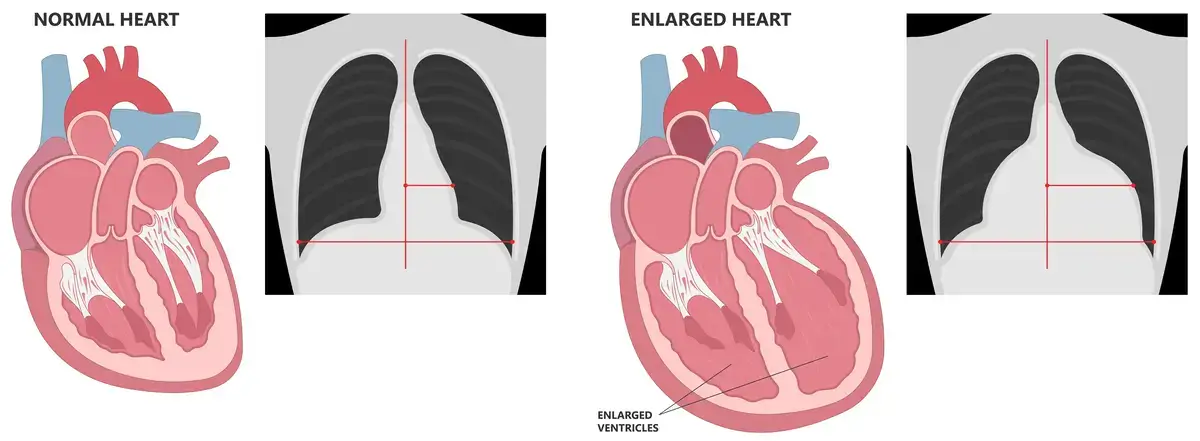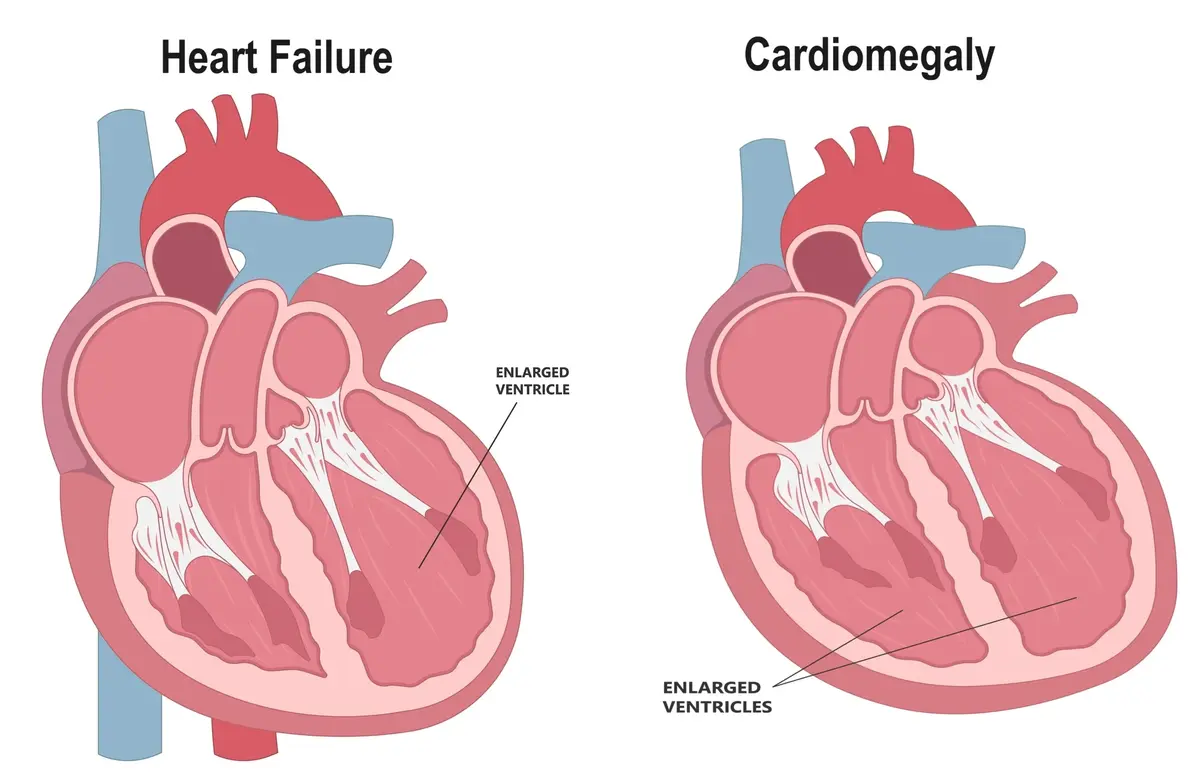Cardiomegaly: About, Causes, Symptoms, and Treatment Options
Welcome to The Harley Street's comprehensive guide to cardiomegaly. Cardiomegaly, also known as an enlarged heart, refers to a condition where the heart is larger than normal, impacting its ability to function efficiently. In this guide, we will explore the causes, symptoms, diagnosis, treatment, prevention, and living with cardiomegaly to provide you with a better understanding of this condition.
What is Cardiomegaly?

Cardiomegaly can be a result of various conditions affecting the heart muscle, such as heart failure, cardiomyopathy, heart valve disease, coronary artery disease and genetic factors. Here are some types of cardiomegaly:
Dilated Cardiomyopathy (DCM)
This is one of the most common causes. It involves the enlargement of the heart chambers, particularly the left ventricle. This causes the heart's walls to become thin, reducing the pumping ability.
Hypertrophic Cardiomyopathy (HCM)
In HCM, the heart muscle becomes abnormally thick, especially in the left ventricle, resulting in an enlarged left ventricle. This hypertrophy can lead to stiffness and difficulty pumping blood effectively, forcing the heart to work harder to meet the body's demands.
Restrictive Cardiomyopathy
This type involves stiffening, restricting the heart's ability to expand and contract properly. The heart chambers may become smaller, impairing filling and blood pumping.
Ischemic Cardiomyopathy
Resulting from coronary artery disease and myocardial infarctions (heart attacks), ischemic cardiomyopathy involves damage to the heart due to insufficient blood supply. The affected area may scar, potentially leading to an enlarged heart.
Arrhythmogenic Right Ventricular Dysplasia (ARVD)
ARVD is a condition where the muscle tissue of the right ventricle is gradually replaced by fat and scar tissue. This can lead to an enlarged right ventricle and increase the risk of arrhythmias.
Valvular Heart Disease
Conditions such as aortic stenosis or mitral regurgitation, where heart valves are damaged or dysfunctional, can lead to an enlarged heart as the chambers work harder to compensate for the valve problems.
Signs and Symptoms
The symptoms of an enlarged heart may include chest pain, heart murmur, fatigue, breathlessness, dizziness, and swelling in the legs and abdomen. It can also lead to an abnormal heart rhythm and an increased risk of heart complications. Other symptoms may include fainting, difficulty during physical activity, and a sensation of rapid, fluttering, or pounding heartbeats.
In some instances, an enlarged heart may not cause any symptoms, and an individual might not be aware of their condition until it's diagnosed during a physical exam or imaging tests. An enlarged heart can be caused by factors such as high blood pressure, heart valve disease, cardiomyopathy, and other heart complications. It's essential to seek medical attention to prevent further complications if you experience these symptoms.
Causes of Cardiomegaly
Common Causes
Cardiomegaly includes various underlying conditions and risk factors that contribute to the enlargement of the heart. Here are some of the primary causes:
- Hypertension (High Blood Pressure): Persistent high blood pressure forces the heart to work harder to pump blood throughout the body, compromising efficiency.
- Coronary Artery Disease (CAD): CAD is a condition in which the blood vessels supplying the heart experience narrowing or blockage, limiting blood flow. The heart may enlarge as it compensates for the diminished blood supply.
- Valvular Heart Disease: Malfunctioning heart valves can disrupt the normal flow of blood within the heart, causing it to enlarge. Conditions such as aortic stenosis or mitral regurgitation can contribute to cardiomegaly.
- Myocarditis: Inflammation of the heart muscle caused by viral or bacterial infections can result in cardiomegaly. The inflammation weakens the heart, enlarging it as an adaptive response to compensate for reduced pumping efficiency.
- Obesity: Excess body weight places additional strain on the heart, requiring it to pump more blood to meet the body's needs. Obesity is often associated with other risk factors, such as high blood pressure and diabetes, which further contribute to cardiomegaly.
- Chronic Kidney Disease: Kidney dysfunction can lead to fluid retention in the body, including the tissues around the heart. The increased fluid load can result in the heart enlarging as it pumps against this resistance.
- Thyroid Disorders: Both hypothyroidism (underactive thyroid) and hyperthyroidism (overactive thyroid) can impact heart function. Specifically, hyperthyroidism can result in an elevated heart rate and stress on the cardiac muscles.
- Alcohol Abuse: Excessive alcohol consumption can weaken the heart over time, contributing to cardiac complications. Alcoholic cardiomyopathy is a specific condition associated with chronic alcohol abuse.
- Pregnancy-related Factors: Conditions such as preeclampsia, where high blood pressure occurs during pregnancy, can contribute to changes in heart size. Additionally, some women may experience this phenomenon due to the increased blood volume and cardiac output during pregnancy.
- Congenital Heart Conditions: Some individuals may have congenital heart conditions predisposing them to cardiomegaly. These conditions are present from birth and can affect the structure and function of the heart.
Enlarged Heart and Heart Failure

Heart failure can contribute to the development of an enlarged heart, as it cannot pump blood effectively, causing it to work harder and eventually enlarge. In cases of heart failure, the heart is weakened, and its chambers may dilate, resulting in the heart becoming enlarged and less efficient in pumping blood. Medical professionals may diagnose this condition by noting that the heart is enlarged through imaging or diagnostic tests. Therefore, the term 'heart is enlarged' indicates the physiological changes associated with heart failure and its impact on the heart's size.
Genetic and Acquired Causes of Cardiomegaly
In some cases, cardiomegaly can be inherited or associated with certain genetic conditions, while acquired causes include infections, autoimmune diseases, and chronic conditions. A family history of cardiomegaly can also contribute to an individual's risk factors for developing an enlarged heart.
Diagnosing Cardiomegaly
Diagnosis and Tests
Diagnosing cardiomegaly involves conducting physical examinations, imaging tests such as chest x-rays, echocardiograms, and cardiac MRIs, and evaluating the patient's medical history and symptoms.
Treating Cardiomegaly
Treatment Options
Treatment for cardiomegaly aims to address the underlying cause and manage symptoms. It may involve medications, surgical interventions, lifestyle changes, and management strategies to improve heart function and reduce complications.
Medications
Medications such as ACE inhibitors, beta-blockers, diuretics, SGLT2 inhibitors, and anticoagulants may be prescribed to manage blood pressure, heart rhythm, and fluid retention in patients with an enlarged heart.
Heart Surgery for Cardiomegaly
In some cases, heart surgery, including heart valve repair or replacement, coronary artery bypass grafting, or even heart transplant, may be necessary to treat severe cases of cardiomegaly and restore normal heart function. People with cardiomegaly may undergo these surgical interventions to address the underlying issues and improve their heart health.
Lifestyle Changes and Management Strategies
Engaging in regular exercise, following a heart-healthy diet, managing stress, and avoiding smoking and excessive alcohol consumption are important lifestyle modifications for individuals with cardiomegaly.
Preventing and Living with Cardiomegaly
Preventive Measures
Preventing cardiomegaly involves managing risk factors such as hypertension, diabetes, and obesity, as well as seeking early treatment for conditions that can adversely affect the heart muscle.
Healthy Living with an Enlarged Heart
Living with an enlarged heart requires regular monitoring, adherence to medication regimens, and healthy lifestyle choices to reduce the strain on the heart and improve overall well-being.
Managing Symptoms
Educating oneself about the condition, recognising symptoms, and seeking medical attention for any changes or worsening symptoms are essential in effectively managing cardiomegaly and preventing complications.
Fitness and Exercise Considerations
Consulting with healthcare professionals to determine safe and appropriate exercise routines and understand exercise limitations is crucial for individuals with an enlarged heart to stay active while minimising risks.
Potential Complications and Risks
Complications of cardiomegaly include congestive heart failure, arrhythmias, blood clots, and an increased risk of heart-related emergencies, highlighting the importance of ongoing monitoring and proactive management.
Conclusion
Cardiomegaly, or an enlarged heart, can significantly impact an individual's health and quality of life. Understanding the causes, symptoms, treatment options, prevention, and management strategies is crucial in effectively addressing this condition and promoting heart health. Cardiomegaly can be serious. At The Harley Street, we are dedicated to providing comprehensive care and support for individuals dealing with cardiomegaly, helping them lead fulfilling and healthy lives.


